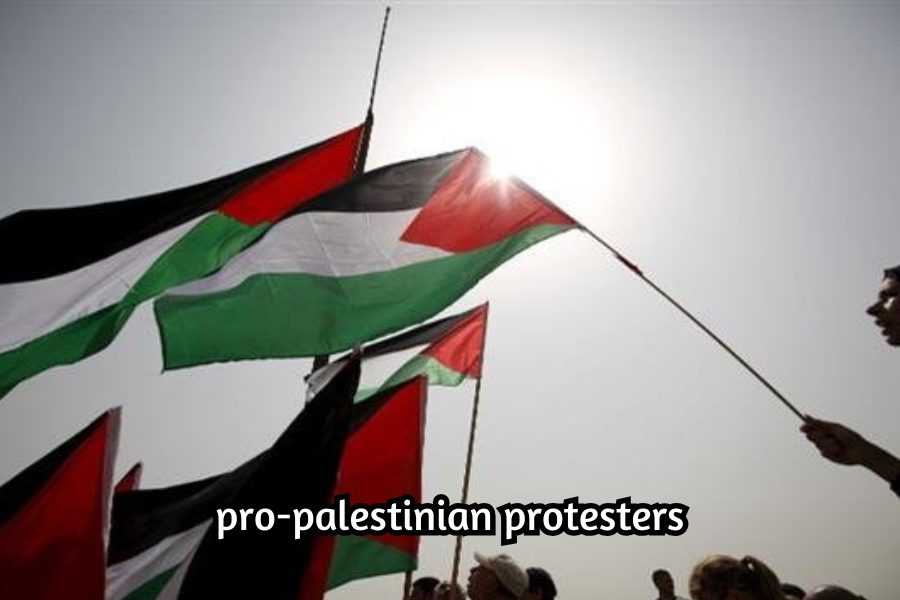Introduction to Pro-Palestinian Protesters
Pro-Palestinian Protesters have been a significant part of global activism for decades, especially as tensions in the Middle East have escalated. These protests are often sparked by various humanitarian concerns, particularly regarding the treatment of Palestinians by Israeli forces, human rights violations, and the ongoing conflict that has ravaged the region. In recent years, these protests have gained new momentum, attracting widespread attention during global events and crises.
Understanding the Motivation Behind Protests
Historical Context
The roots of the pro-Palestinian protest movement are deeply intertwined with the long-standing Israeli-Palestinian conflict. The displacement of Palestinians following the creation of Israel in 1948, as well as the various wars and skirmishes that followed, have fueled anger and a desire for justice. Protests have emerged as a platform for demanding recognition of Palestinian rights, especially in the context of what many activists label as “genocide” and “ethnic cleansing” by Israeli forces.
The Role of Global Awareness
The role of social media and international news in amplifying Palestinian voices cannot be overstated. In the digital age, images and videos of violence against Palestinian civilians are shared globally, leading to a surge in activism. High-profile events like the 2021 Gaza conflict and more recently, the attacks on Gaza in 2023, have reignited the debate, with protests erupting worldwide, from North America to Europe and beyond.
The Rise of Protests: 2023-2024
The Impact of Recent Escalations
In the wake of recent escalations in Gaza, including the October 2023 Hamas attack on Israel, protests have surged globally. These demonstrations have been characterized by strong demands for ceasefires, humanitarian aid, and an end to arms sales to Israel. Activists argue that the global community’s response to the Palestinian plight has been inadequate and that more direct actions are needed.
Protest Strategies
Protesters have employed a variety of tactics to amplify their message. In some cases, these have involved large-scale demonstrations, sit-ins, and blocking key infrastructure like highways and public events. Notably, pro-Palestinian groups disrupted high-profile events such as the Macy’s Thanksgiving Day Parade in 2024, as activists called for an end to the conflict and justice for Palestinians.
You May Also Like To Read: Wappingers Explosion: A Comprehensive Insight into the Incident and Its Impact
The International Pro-Palestinian Movement
Protests in North America
In the U.S. and Canada, Pro-Palestinian Protesters have become a regular occurrence, particularly in large urban centers like New York City and Toronto. These protests often take place outside government buildings, as well as at sites symbolic of American support for Israel, like the U.S. Capitol or major American corporations involved in arms sales.
European Solidarity
European cities have also witnessed strong pro-Palestinian movements. In London, Paris, and Berlin, rallies and protests draw attention to the growing humanitarian crisis in Gaza. Europe’s pro-Palestinian demonstrations often see a coalition of human rights groups, political organizations, and grassroots activists working together to advocate for Palestinian rights.
Public Perception and Reactions to Protests
Support from Various Groups
The pro-Palestinian movement has garnered support from various segments of society, including academics, celebrities, human rights organizations, and political figures. Prominent individuals like filmmaker Ken Loach and activist Greta Thunberg have spoken out in support of Palestinian rights. Additionally, international groups such as Amnesty International and Human Rights Watch have repeatedly criticized Israel for alleged violations of Palestinian rights.
Criticism and Backlash
However, these protests have also faced significant backlash. Many critics accuse pro-Palestinian demonstrators of endorsing violence or promoting antisemitism, especially when rhetoric becomes inflammatory. This division has made it difficult for the movement to maintain universal support, and some rallies have faced violent counter-protests or interventions from law enforcement.
Legal and Social Consequences
Legal Repercussions for Protesters
Many pro-Palestinian protesters have faced legal consequences for their activism. Arrests during demonstrations have become a common outcome, especially when protests block major streets or disrupt high-profile events. For instance, in 2024, 21 pro-Palestinian activists were arrested for disrupting the Macy’s Thanksgiving Day Parade in New York City.
The Role of Law Enforcement
Law enforcement agencies have been frequently involved in clearing protests, with varying levels of force used to disperse crowds. In some cases, this has resulted in violent clashes, and protesters have been charged with offenses ranging from trespassing to resisting arrest. The police’s role in dealing with these demonstrations is often contentious, with some viewing them as necessary to maintain order and others criticizing them as excessive.
You May Also Like To Read: The Schoharie Limo Crash: A Tragic Event That Changed New York’s Transportation Safety Landscape
The Future of the Pro-Palestinian Protest Movement
The Movement’s Sustainability
As the Israeli-Palestinian conflict remains unresolved, it is likely that Pro-Palestinian Protesters will continue to be a major part of global activism. However, the movement will need to evolve, balancing radical calls for action with the need for diplomatic solutions. The pressure on governments to act on Palestinian rights will likely intensify, particularly as more voices join the call for a peaceful resolution.
The Role of Technology in Activism
Looking forward, technology will play an increasingly important role in shaping the pro-Palestinian movement. Social media platforms, online petitions, and digital campaigns will continue to mobilize people around the world. As the conflict evolves, so too will the tools and tactics used by activists to ensure their message is heard on a global scale.
Conclusion
Pro-Palestinian Protesters have become a prominent feature of global activism, with their roots firmly embedded in the complex and longstanding Israeli-Palestinian conflict. The movement, fueled by humanitarian concerns and the desire for justice, has gained momentum through the power of digital media, uniting people across borders in solidarity with Palestinians. While these protests have achieved significant visibility, they have also faced challenges, including legal repercussions and backlash. The future of the pro-Palestinian movement appears poised for continued evolution, with technology playing an increasingly pivotal role in mobilizing global action. As the fight for Palestinian rights persists, the movement will need to balance its call for immediate action with the pursuit of long-term, peaceful solutions.
FAQs
1. What are the main goals of pro-Palestinian protesters?
Pro-Palestinian protesters primarily advocate for the recognition of Palestinian rights, an end to human rights violations, and justice for Palestinians in the context of the Israeli-Palestinian conflict. Key demands include ceasefires, humanitarian aid, and political recognition of Palestinian sovereignty.
2. Why are Pro-Palestinian Protesters so widespread?
The widespread nature of Pro-Palestinian Protesters is driven by global awareness, particularly amplified through social media. Events such as military escalations, like the 2023 Gaza conflict, spur international protests, bringing attention to the humanitarian crisis faced by Palestinians.
3. How do pro-Palestinian protesters typically express their message?
Protesters employ a variety of strategies, including large-scale demonstrations, sit-ins, blocking infrastructure, and organizing protests at symbolic sites like government buildings or major corporations. These tactics aim to raise awareness and influence public opinion and policy.
4. What has been the reaction to Pro-Palestinian Protesters?
While Pro-Palestinian Protesters have garnered support from human rights organizations, activists, and global figures, they have also faced criticism. Some critics accuse protesters of endorsing violence or antisemitism, leading to divisions in public opinion and occasional counter-protests or clashes with law enforcement.
5. What legal consequences can pro-Palestinian protesters face?
Protesters often face legal repercussions, including arrests for disrupting public events or blocking major streets. Law enforcement sometimes uses force to clear protests, leading to violent clashes or charges such as trespassing or resisting arrest.
6. How will the pro-Palestinian movement evolve in the future?
The pro-Palestinian movement is expected to continue evolving, with an increased reliance on technology to mobilize people and raise awareness. As the conflict remains unresolved, the movement will likely need to balance radical calls for action with the need for diplomatic solutions to ensure its sustainability.
Explore the latest news and updates on Times Bullion THANK YOU!

